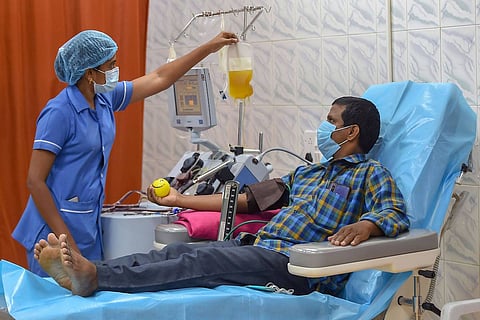

The first sign was high fever. And when the coronavirus test results came two days later, Chennai-based Saminathan* realised he had COVID-19. However, the interpretation was ‘medium positive’, so his family decided to keep him in home isolation. But a day later, Saminathan experienced difficulty in breathing, prompting his son Krishnan* to rush him to a family doctor. The doctor told the family that Saminathan’s oxygen saturation level was low and he needed hospitalisation. After three referrals, the family got a bed with oxygen support in a private hospital in Kilpauk. However, Krishnan alleges that the hospital utilised their emergency situation to maximise its gains.
The hospital kept Saminathan for nine days and the family ended up paying a total of Rs 4.14 lakh. This, Krishnan says, as against the original bill of around Rs 2.7 lakh. “The hospital refused to follow the government set cap on COVID-19 treatment charges. They also took an advance of Rs 1.5 lakh which wasn’t returned,” he alleges. Krishnan accuses the hospital of not even producing the bill for some transactions.
Krishnan is not the only one to experience this. Months into the pandemic, there are several allegations against private hospitals in Tamil Nadu for swindling money from coronavirus patients and their kin. This, despite the Tamil Nadu government capping COVID-19 treatment in private hospitals on June 6. The health department fixed two slabs for hospitals classified as A1 and A2, and A3 and A4 depending on the number of beds and doctors available. A hospital belonging to A1 and A2 grade can collect Rs 7,500 per a day from asymptomatic or mildly symptomatic COVID-19 patients, while hospitals in the A3 and A4 grades can collect Rs 5,000 per day. The maximum charge for Intensive Care Unit (ICU) for private hospitals has been fixed at Rs 15,000 per day.
The private hospital where Saminathan was receiving treatment belongs to the A3-A4 category, says Krishnan. “On October 3, the hospital told us to immediately pay Rs 1,50,000 advance for admitting my father. When I said I have insurance, they told me that since it was midnight, there were no insurance agents to help with the transactions at that hour. It was a huge amount, but I ended up paying because I didn’t have another option. I still have a slip for the transaction," he says.
Krishnan's father was kept in the ICU for one day and was then shifted to the normal ward. Everything seemed fine for the first couple of days, but the hospital allegedly started to delay the insurance claim, even four days after Saminathan was admitted. "The hospital only then informed me that the insurance firm will not pay the whole claim and only a partial claim. I was taken aback, since I knew that I had a scheme where full insurance claim was possible. When I started questioning them, the hospital said it will not be able to produce a bill for the exact charges for the room and ICU."
"They told me that they charge Rs 40,000 per day for ICU and Rs 30,000 as room charge but they will mention only Rs 15,000 for ICU and Rs 5,000 as room charge on the bill, excluding the treatment," he alleges.
Frustrated, Krishnan decided to move Saminathan back home and the hospital also agreed to discharge him on the ninth day after much insistence. "They gave me a bill for Rs 2.76 lakh and my insurance was sanctioned for Rs 2.53 lakh out of this amount. To my shock, the hospital told me that my advance amount will not be returned, which made the total bill Rs 4.14 lakh. The hospital refused to give me a bill for the total amount and also didn’t return the advance," Krishnan says.
While the state health department officials admit to receiving such complaints about private hospitals overcharging, they say that they try to mediate between the aggrieved parties than revoking the hospital’s license at this point in time.
A senior health department official tells TNM, “We make the hospitals settle the additional amount charged, and like this, we have settled 18 cases across Tamil Nadu,” he says. “However, if a hospital is consistently overcharging or if there are procedural lapses or if it is underreporting deaths, then we revoke the license. But usually, we try to mediate between the families and the hospitals.”
“The issue of overcharging can be settled immediately – we calculate the bill amount and redress it. If this has happened in Chennai, we can resolve it in a day or two,” the official says.
In Tamil Nadu, action has been taken against nine institutions; three institutions have lost their license due to these issues.
On the other hand, there is an argument that the price cap fixed is not feasible for private hospitals to sustain. The Tamil Nadu unit of Indian Medical Association had accused the government of failing to listen to the stakeholders while fixing the rates for COVID-19 treatment.
The IMA State president CN Raja, who earlier supported the government’s move to cap COVID-19 treatment price in private hospitals, says, “Till now, many hospitals are purchasing Remdesivir and other drugs required for COVID-19 treatment at a higher cost. Can the government give a white paper on the cost of treating a patient at a government hospital? They cannot, so it is unfair to fix Rs 15,000 per day for ICU treatment without clarifying if this includes medical expenses or not,” he says.
“When the problem of overcharging in government hospitals started, we worked on the price capping and sent a proposal to the government. However, the government did not respond, and a few days later they released a government order fixing the rates. Now, there are complaints that the hospitals charge more, but there needs to be a revision of rates. The government did not fix the right amount by asking the stakeholders,” he adds.